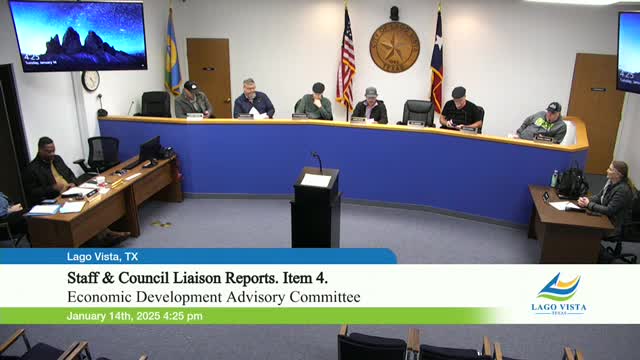Lago Vista advisory committee weighs EDC Type B bylaws, plans subcommittee and attorney briefing
Get AI-powered insights, summaries, and transcripts
Subscribe
Summary
Members of the Lago Vista Economic Development Advisory Committee discussed draft bylaws for an Economic Development Corporation (EDC) Type B, debated board composition and funding limits tied to a CapMetro sales-tax allocation, and agreed to form a subcommittee and schedule a briefing with the city attorney for further work.
The Lago Vista Economic Development Advisory Committee (EDAC) spent the bulk of its Jan. 8 meeting reviewing draft bylaws for an Economic Development Corporation (EDC) Type B and set a subcommittee to work further with the city attorney.
Why it matters: An EDC Type B would create a formal corporation the city could use to pursue grants, public–private partnerships and certain infrastructure projects that the city’s existing accounts cannot accept. Committee members said forming the corporation now would position Lago Vista to pursue outside funding and act quickly on opportunities when they arise.
Eric Zeno, Lago Vista’s economic development director, told the committee an EDC Type B could be used to pursue “foundations, grants, and especially public–private partnerships,” and noted that the city currently lacks a dedicated local sales‑tax allocation for that work because those dollars go to Capital Metro (CapMetro) under an existing agreement. Zeno said forming a Type B now would allow the city to “learn what it can do and go ahead and take advantage of some of the opportunities that an EDC Type B could give us.”
Committee discussion focused on the proposed board’s makeup in the draft bylaws. Members cited guidance on municipal EDCs from the Texas comptroller’s materials and discussed how many board members should be allowed to be affiliated with the city. The draft showed a cap on affiliated members; committee members debated whether to recommend permitting up to three affiliated members, or to limit council membership to two of those slots to reduce potential conflicts.
“Personally, I don’t think it’s a good idea to have council as board members,” committee member Jeff said, expressing concern that overlapping roles could “muddle things” and reduce checks and balances. Other members said having council and staff representation can help coordinate projects and avoid duplication.
No final vote was taken to adopt the bylaws. Instead the committee agreed to form a small subcommittee to refine recommendations and to schedule a Zoom briefing with the city attorney so members could ask legal and procedural questions about board composition, eligibility, and statutory limits. City staff agreed to check the city attorney’s availability and to circulate proposed meeting times.
Committee members also noted limits in current funding: Zeno said the city does not presently have a sales‑tax stream available to fund an EDC because those dollars are committed to CapMetro; he described that constraint as the main reason the EDC would initially be used to attract grants or private investment rather than to fund projects from local tax revenues.
The committee asked staff to draft recommended language for the bylaws that could be forwarded to the city attorney for review; staff said they would bring a revised draft back to EDAC and then, if appropriate, forward it to city council for consideration.
Looking ahead: EDAC will convene a subcommittee meeting (by Zoom) to refine the bylaws draft and to prepare questions for the city attorney. Staff will follow up by email with available dates and the attorney’s schedule so as many members as possible can attend the legal briefing.
